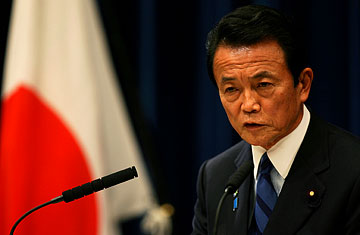
Japanese Prime Minister Taro Aso unveiled new economic stimulus measures to tackle the fallout from the global recession on Oct. 30 in Tokyo
Bikkuri Honpo, a chain of Japanese sushi restaurants, lived up to its name last week. Literally translated, the chain is called the "original house of surprise." The surprise? The 25-year-old business, which for several years had been expanding quickly in Tokyo and appeared to be thriving, filed for bankruptcy protection, dragged down by $50 million in liabilities.
You'd think selling raw fish in the sushi capital of the world would be a recession-proof business. But Japan's economy, the world's second largest, is weakening so quickly, not even seemingly strong enterprises are safe. In September, the number of Japanese companies filing for bankruptcy shot up 34.5% compared with September 2007. That's the biggest spike in business failures since March 2000.
The jump in business failures is one reason why Tokyo yesterday announced a $51 billion economic stimulus package aimed at restoring financial stability to the country. Among other measures, the government will inject more money than originally planned into financial institutions, offer tax breaks on housing loans, and guarantee loans taken out by small-and medium-sized businesses. Prime Minister Taro Aso said the radical package was needed because "a harsh storm seen only once in 100 years is raging."
Analysts say government officials are trying to keep a wave of business failures in the property sector from engulfing the larger domestic economy. Commercial and residential real estate markets in Japan are slumping, and with banks reluctant to lend, developers, contractors and other property companies are increasingly in peril. On Oct. 9, New City Residence Corp., a real estate investment trust, went bust, becoming the first REIT to fail since the trusts were allowed to sell stock to the public. "Property developers could face more bankruptcies if banks continue their severe attitude," says Masahiro Mochizuki, a REIT analyst at Credit Suisse in Tokyo. "And companies in other sectors may go bankrupt because the economic condition in Japan is getting worse."
Andreas Schuster, head of research at CLSA, says smaller property developers are most at risk and might face severe losses in the coming months. A lack of financing means it's nearly impossible for them to find the cash to continue operations. Japan has not yet seen "the colossal collapse you could expect if you look at the oversupply that is built into the system," he adds. But Schuster says falling property prices will result in big losses for developers large and small.
Some are optimistic that targeted measures to prevent more business failures, such as those proposed by Aso's adminstration this week, can stem the tide."The most important thing is to prevent the bankruptcy of the real estate companies, so that it doesn't expand to other industries," says Yoji Otani, senior analyst at Credit Suisse.
But even if the real estate slide is halted, that may not be enough to keep the domestic economy afloat. The Bank of Japan and the Ministry of Finance recently released reports projecting weakening local economies throughout the country. Japanese household spending in September is down for the seventh straight month. The number of heads of households without a job rose 20,000 from last year, up for the sixth straight month, to 610,000.
Meanwhile, an appreciating currency—the yen hit a 13-year high against the dollar on Oct. 24—is hurting Japan’s exporters. This week, Honda cut its annual revenue forecast for the 2009 fiscal year to $5.2 billion, a 19% decline compared with FY2008 results. Sony announced that its profit dropped 72% in the first half of the year.
Help may be on the way. But Aso must convince a divided Japanese parliament to pass his stimulus package amid growing skepticism that it will be too little, too late.